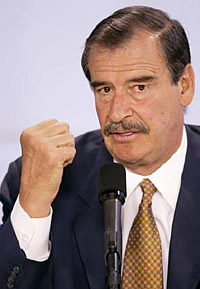 |
 |
 |
 Business News | September 2005 Business News | September 2005  
Gov't Subsidies Cushion Effect of Katrina
 Thomas Black & Adriana Arai - Bloomberg Thomas Black & Adriana Arai - Bloomberg


| | President Vicente Fox has said the government will subsidize fuel prices to help limit the effect of Hurricane Katrina on the nation's economy. |
President Vicente Fox said his decision to subsidize fuel prices in the wake of Hurricane Katrina will limit the economic effect of the storm and allow the government to meet its target of 3.5 percent growth this year.

The 63-year-old president, seeking to keep domestic energy prices from rising, said this week the government would sell gas to companies and consumers below cost. The government will spend US870 million on the program by year-end, according to state oil company Petroleos Mexicanos.

"We're going to soften the impact of natural gas," Fox told Bloomberg News yesterday in an interview at Mexico's United Nations offices in New York. "So that impact will not hit the Mexican economy." Fox's decision underscores one of the biggest failures of his administration the inability to persuade congress to open the energy industry to private investment, said Federico Estevez, a politics professor at Mexico's Institute of Technology, in a telephone interview from Mexico City.

Mexico, the world's sixthlargest crude producer, hasn't invested enough to drill gas from its own deposits and relies on U.S. imports to meet 20 percent of its needs. The nation also depends on U.S. imports of gasoline to meet 25 percent of domestic demand because the government can't afford to expand refining capacity.

Fox, a former Coca-Cola Co. executive whose election in 2000 ended seven decades of oneparty rule in Mexico, faced an opposition-led congress that rejected his proposals to open the energy industry to private investment and voted down his initiative to reduce the government's dependence on oil revenue by raising taxes on food and medicine.

"With a divided congress and three parties, each not wanting to give anybody credit, he just couldn't get the legislation through," James Wilkie, a professor of history at the University of California, Los Angeles who chairs a program on Mexico, said in a telephone interview from Los Angeles.

Fox said in the interview that Mexican economic growth would be 1 percentage point higher had congress approved his energy, tax and labor bills at the beginning of his six-year term. Last year, the economy expanded 4.4 percent, the quickest growth in Fox's term, following 1.3 percent in 2003 and 0.8 percent in 2002.

Fox said he sent two proposals to congress yesterday to open up pipeline maintenance and production of dry natural gas to private companies. The last energy bill he sent to congress was rejected, he said.

"The ball is in the congress's court," Fox said. "They have to respond to public opinion and the Mexican people." After Katrina struck the U.S. Gulf Coast on Aug. 29 killing hundreds of people, Fox sent a ship with rescue equipment to New Orleans and about 200 Mexican troops to San Antonio to help feed refugees there. The government also set up a fund to make cash contributions to the cleanup. It's the second time that Mexican troops have crossed the border since the U.S.-Mexican war broke out in 1846.

"We're very proud of the Mexican army coming to the U.S., crossing that border and helping people with humanitarian assistance," Fox said in the interview.

The storm shut down eight refineries on the U.S. Gulf Coast that account for about 10 percent of U.S. gasoline production, causing prices to shoot above US3 a gallon. The natural gas that Mexico buys from Texas rose 70 percent to more than US11 per million British thermal units, according to Mexico's government.

Fox this week set the price of natural gas used mostly by northern manufacturers at US7.65 per million BTUs for September, about US3.35 less than market rates. For households, electricity tariffs and liquefied gas prices will rise no more than 4 percent in 2006, while the cost of gasoline at the pump will increase no more than 3 percent.

Natural gas for October delivery fell 23.6 cents to US10.93 per million British thermal units in New York trading as of 11:04 a.m. Futures rose as high as US12.30 on Aug. 31, the highest since the contract was introduced in 1990.

Pemex is currently buying U.S. gasoline at US3.05 a gallon and selling at US2.50, Luis Ramirez, the company's chief executive, said at a news conference Sept. 13.

The latest announcement was the second time this year Fox proposed subsidies to soften the blow of rising fuel prices on Mexico's US677 billion economy, Latin America's largest, and curb inflation.

Mexico, which exports about 1.8 million barrels of oil per day, benefits from higher international crude, which jumped to a record high of US70.85 a barrel on Aug. 30. Oil for October deliver fell 29 cents to US64.80 per barrel as of 11:19 a.m. on the New York Mercantile Exchange. Mexico's mix of oil closed at US50.57 a barrel yesterday, almost double the US27 a barrel the government had estimated for this year's budget.

Gross domestic product expanded 3.1 percent in the second quarter after 2.4 percent growth in the first. Mexico's central bank estimates Katrina will slow economic growth to about 3 percent this year, Jesϊs Marcos Yacaman, one of the bank's four deputy governors, said last week.

Fox said Mexico's economy won't be hurt as much by a U.S. economic slowdown because local consumer spending boosted by an increase in bank lending has taken over from exports as the driver for growth.

"Consumption in Mexico has become the number one motor moving our economy," Fox said. "We have balanced out this situation." | 
 | |
 |



